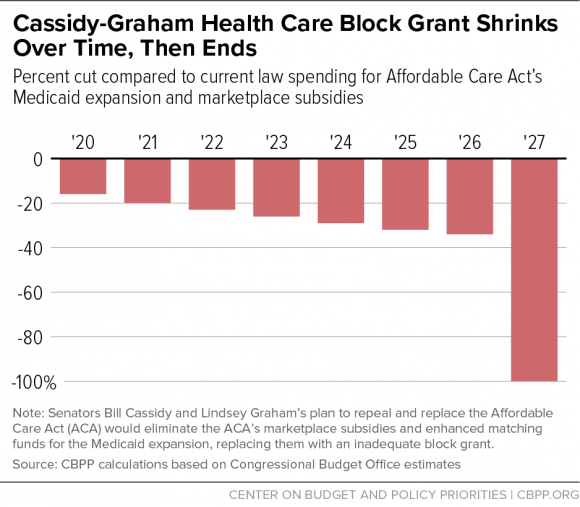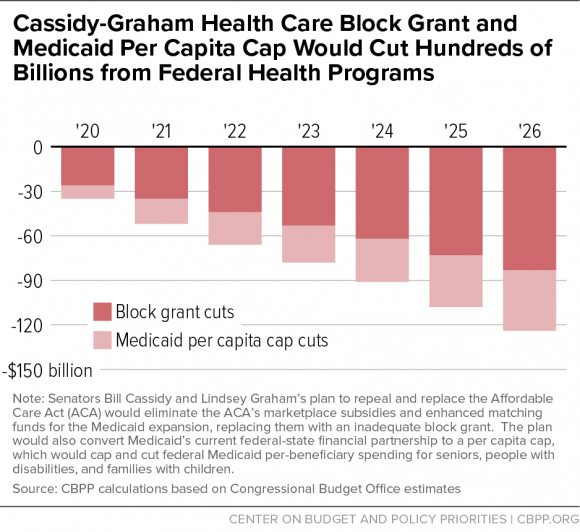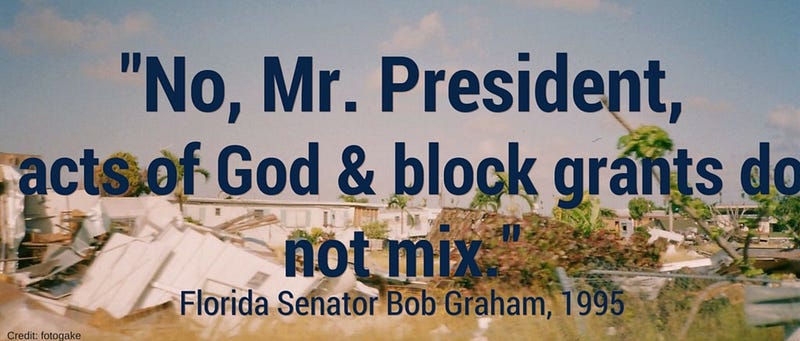EDITOR’S NOTE: This was originally published on Medium.
Why the Current Sen. Graham Should Heed the Warnings of a Former Sen. Graham
Sens. Lindsey Graham (SC) and Bill Cassidy (LA) are working on a new legislative proposal to eliminate Obamacare by converting it into a block grant to states, while simultaneously imposing a per capita cap on the Medicaid program, which the Senate previously rejected.
According to Vox’s Sarah Kliff, “. . .Senate Republicans rejected four different Obamacare repeal plans. . . Now just one remains — and, in many ways, it’s the most radical one yet.”
Kliff outlines a number of problems with the approach in her piece, but the two of most concern to the nation’s most vulnerable families are the legislation’s proposals to impose a per capita cap on Medicaid for children, people with disabilities, and senior citizens (along with an option for states to convert that to a block grant), and a full-blown conversion of Medicaid coverage for low-income adults and Obamacare tax credits into block grants to states.
These changes would be an outright disaster, as the per capita caps would significantly harm low-income seniors, people with disabilities, and children, and be compounded by the block grant provisions, which are nothing more than a radical redistribution of federal funding from mostly urban states that have expanding Medicaid to rural states that did not.
With respect to the latter provision, the Graham-Cassidy proposal is nothing more than a cynical shuffling of federal dollars from some states to others in a somewhat desperate attempt to entice some governors and senators in so-called “winner states.”
However, despite some fancy PowerPoint charts and a full-court press for the legislation in a series of Breitbart interviews with Sens. Graham, Cassidy, and former Sen. Rick Santorum, the numbers do not work because: (1) the plan still includes deep spending cuts to state Medicaid programs that were previously rejected by the Senate; and, (2) funding for the block grant would expire entirely in 2026.
In an analysis of the proposal, as it was proposed as an amendment during the Senate health “reform” debate, the Center on Budget and Policy Priorities (CBPP) concludes:
All states would eventually face deep and growing cuts to federal coverage programs due to the plan’s radical structural changes to these programs, which would make federal funding far less responsive to need. But some states would suffer immediate, disproportionate harm because the block grant would not only cut overall funding for the Medicaid expansion and marketplace subsidies but also redistribute the sharply reduced federal funding across states, based largely on criteria unrelated to states’ actual spending needs and the coverage gains they’ve achieved under the ACA.


With respect to the CBPP point that a conversion of health care funding to block grants “would make federal funding far less responsive to need,” it is ironic that the states represented by Sens. Graham and Cassidy are potentially among the worst harmed because both Louisiana and South Carolina are two of the most highly vulnerable states for natural disasters, such as hurricanes. Under current law, federal Medicaid funding automatically increases when need rises. That would be no longer the case under a block grant.
Recent event highlight this fundamental problem with the Graham-Cassidy proposal. First, on August 26, 2017, Hurricane Harvey hit the Texas Gulf Coast — not once, but twice — and dumped 27 trillion gallons of rain upon both Texas and Louisiana with devastating consequences. As reported by the New York Times, at least 47 people died and hundreds of thousands of homes and businesses were destroyed in the wake of Harvey.
As if that wasn’t terrible enough, Hurricane Irma slammed into and damaged the entire state of Florida over the weekend. Although reports of the destruction are still coming in, it is clear that the entire State was harmed by this storm in a way that Florida has never seen before in its history.
The problem with capping Medicaid funding is that the arbitrarily determined amount that the federal government would give states under a block grant does not adjust when there are changes in need, such as natural disasters (hurricanes, floods, earthquakes, tornados, wildfires, blizzards, etc.), health care epidemics, or economic recessions. When need goes up, Medicaid would no longer provide additional financial help. In short, Medicaid block grants and per capita caps would compound the harm caused by natural disasters.
As Andy Schneider with Georgetown Center for Children and Families said, “Under block grants, there’s a fixed amount of money, come hell, high water or hurricane.”
In theory, Medicaid per capita caps may not be as awful as block grants, because funding under a per capita cap would grow if the numbers of people qualifying for care rises. However, per capita caps remain an enormous problem, as they would fail to keep pace with any increase in costs per person, or acuity, that would be caused by a natural disaster, epidemic, etc.
In fact, hurricanes, particularly those the size of Harvey, Irma, or Katrina, deliver the triple-whammy of a natural disaster, an economic distress, and increases in health care needs and costs — all at the very same time.
Beyond the deaths most often associated with flash flooding caused by hurricanes, reporter Ben Guarino found numerous examples of how the health of people would be harmed through increased exposure to sharp metal bits and glass in the floodwaters, wild animals, sewage spills, bacteria, respiratory infections, jeopardized immune systems, poor nutrition, lack of access to drugs, mosquitos, and mold, and increased stress and mental health problems.
For example, in a study on the impact of Hurricane Katrina reported by Nature, “The prevalence of PTSD in these regions rose from 15% a few months after the storm to 21% one year later, and the proportion of people experiencing suicidal thoughts more than doubled from 2.8% to 6.4%.”
Furthermore, Kate McLaughlin, director of the Stress and Development Lab at the University of Washington, found that the rate of diagnosable mental health problems increased dramatically after Katrina. She told the New York Times, “Our reading of that is that the stressors were so severe they overwhelmed the coping skills of most kids.”
The fact is that block grants and per capita caps do not account for or adjust to the impact and aftermath of crises, such as hurricanes. This is something that should be of immense concern to Sens. Graham and Cassidy, their governors, and other state leaders. In fact, Texas Gov. Greg Abbott and Florida Gov. Rick Scott should strongly consider withdrawing their previously statements in support of Medicaid block grants. They should recognize that the crisis they are both facing would have been greatly worsened the human, economic, and health care crises caused by Hurricanes Harvey and Irma.
If any governor is unsure about this, they should simply call upon their fellow governor from the Commonwealth of Puerto Rico, whose Medicaid program is a block grant.
As Diane Rowland, executive vice-president of Kaiser Family Foundation, points out:
I think governors like block grants when everything is going well. . . But that doesn’t provide a budget that says ‘oh, but the fourth-largest city in America is underwater and I need a lot more help.’
In addition to an increase in the number and acuity of people seeking health care after a natural disaster, the health care infrastructure in communities hit by a hurricane, flooding, or tornados are often destroyed. For example, Hurricane Katrina destroyed a large part of the health care infrastructure in New Orleans. According to Rowland, Robin Rudowitz, and Adele Shartzer, “A year after Katrina, many hospitals in the New Orleans area [were] still closed, including the Medical Center of Louisiana at New Orleans run by Louisiana State University (LSU), which consists of Charity and University Hospitals . . . .”
Again, as bad as Katrina was, the catastrophe would have been far worse if Medicaid was a block grant. In addition to the loss of federal financing support, the federal government would also be less able to assist states through the use of waivers.
These [Medicaid] waivers have been applied in numerous ways following national and local crises. Waivers in New York City after the Sept. 11, 2001, terrorist attacks loosened the documentation requirements for Medicaid enrollment and allowed New Yorkers who had been affected by the tragedy to gain coverage. And, Medicaid waivers have helped the federal government provide targeted and direct resources to populations affected by lead poisoning in Flint, Michigan. In the aftermath of Hurricane Katrina, the Department of Health and Human Services approved as many as seventeen separate waivers.
Just this past week, in the aftermath of Hurricane Harvey, Texas has requested a variety of waivers from the federal government for both Medicaid and the Children’s Health Insurance Program (CHIP). As Rowland points out, the Medicaid waivers will provide Texas with even additional federal support. In contrast, the CHIP waiver requests will help in much more limited ways because the program’s financing is in the form of a block grant, which means no additional federal financial support. Any additional funding for CHIP would require congressional action.
When you talk about putting a cap on [Medicaid] you’re talking about saying ‘OK, we’ll build in what you’re spending today but if you have a disaster tomorrow it’s not going to change unless Congress goes back and gives you a special appropriation.’
Incredibly, rather than doing that to help the children in Texas, Louisiana, Florida, and Puerto Rico with additional CHIP funding, Congress is, instead, on the verge of failing to extend CHIP’s funding for the entire nation, which expires at the end of this month.
In 1993, I began working for Sen. Bob Graham (FL), who is unrelated to Sen. Lindsey Graham, in the aftermath of Hurricane Andrew. That experience educated me as to the important role that Medicaid played in providing immediate assistance to the people of South Florida and the disaster Medicaid block grants would have had on people in desperate need. The hurricane, just like an economic recession or epidemic, created problems that often demand both short- and long-term federal assistance.
Subsequently, when House Speaker Newt Gingrich (GA) proposed block granting the Medicaid program in 1995, Sen. Graham spoke about the hurricane as a reason why arbitrary Medicaid caps are unworkable:
. . .when Hurricane Andrew hit south Florida, Mr. President, our Medicaid caseload shot up by 12,000 people. Not only had their homes been blown away, their jobs had been blown away. Therefore, people who had been employed and self-supporting needed the assistance of Medicaid during that time of crisis.
Under block grants, a State that is knocked down to its knees by a flood, earthquake, hurricane, would not find a helping hand from the Federal Government at the time it needed help to get back on its feet. No, Mr. President, acts of God and block grants do not mix.

Moreover, in comments directly at governors that were supporting Gingrich’s Medicaid block grant proposal 22 years ago, Sen. Bob Graham said:
I say shame on the governors of the states who are now cheerleading for the destruction of that partnership. I have a warning for them, or more accurately a proverb for them. The proverb goes as follows: Fish see the worm, not the hook.
Those governors who are salivating, who are so anxious to gobble up block grants being proposed, will feel the hook when their economies stumble, when an epidemic strikes, when a natural disaster hits, when inflation creeps up again, or when their population grows. Worst of all, they will be held accountable in history for killing a program that actually had achieved its objectives and nurtured a national pride in providing basic health care for fragile and vulnerable citizens.
In the aftermath of Hurricanes Harvey and Irma, those words are true more than ever. Senators and governors would all be wise to heed his warning and reject this health “reform” proposal by Sens. Lindsey Graham and Cassidy.
